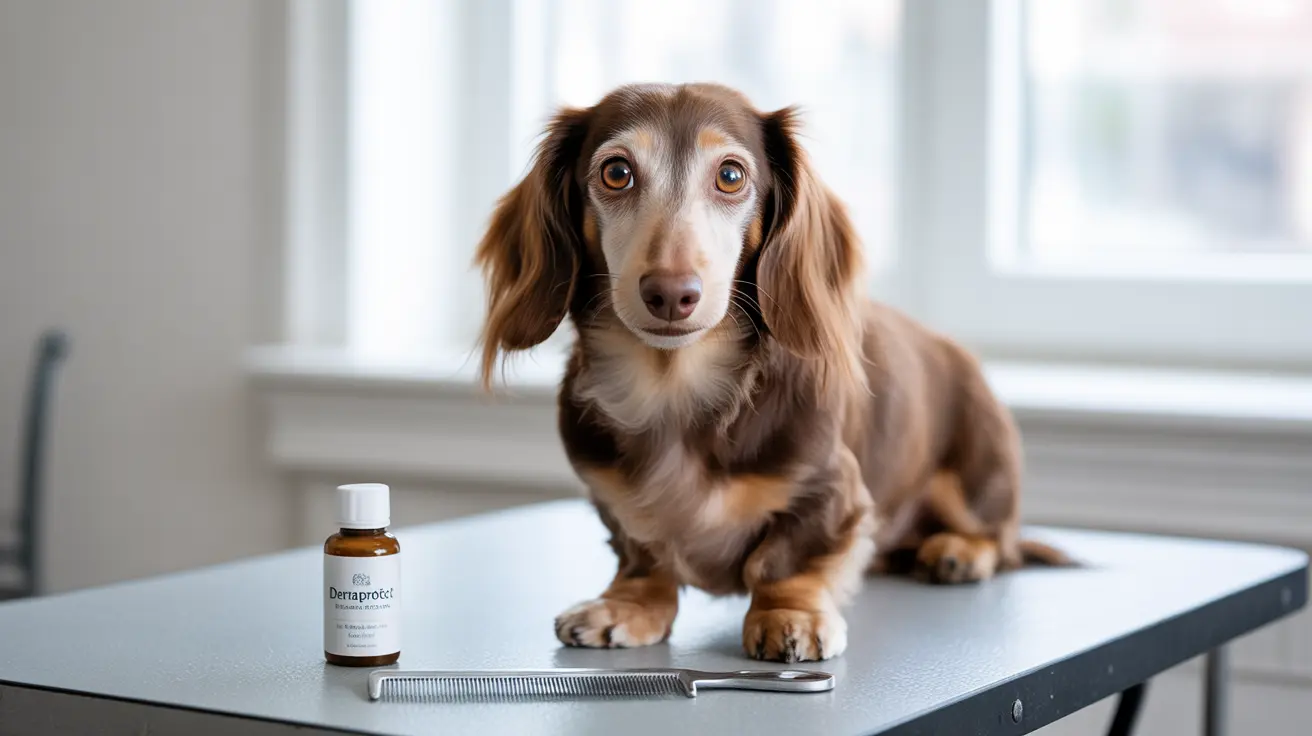La seborrea en perros es una enfermedad cutánea desafiante que afecta a muchos canes, provocando síntomas molestos como exceso de caspa, piel grasa y olores desagradables. Este trastorno crónico de la piel ocurre cuando hay una producción anormal de sebo, el aceite natural que mantiene la piel de tu perro sana e hidratada. Comprender la dermatitis seborreica en perros es fundamental para su manejo efectivo y para la comodidad de tu mascota.
Ya sea que tu perro muestre los primeros síntomas de seborrea canina o haya sido diagnosticado con esta afección, esta guía completa te ayudará a conocer sus causas, identificar los signos y explorar opciones de tratamiento. Descubre todo lo que necesitas saber sobre cómo tratar la seborrea en perros y conseguir su recuperación.
Tipos de seborrea en perros
La seborrea canina se manifiesta en dos formas principales: seborrea seca en perros (seborrhea sicca) y seborrea oleosa en perros (seborrhea oleosa). Muchos perros experimentan una combinación de ambos tipos, por lo que el diagnóstico de seborrea canina preciso y el tratamiento adecuado son esenciales.
Seborrea seca en perros (Seborrhea Sicca)
Este tipo se presenta como piel seca y escamosa, similar a la caspa. Los perros con seborrea seca suelen mostrar descamación excesiva y podrían rascarse con frecuencia debido a la irritación cutánea. Entre las razas propensas a la seborrea seca se encuentran el Cocker Spaniel y el Dachshund, que tienen mayor predisposición genética a la seborrea.
Seborrea oleosa en perros (Seborrhea Oleosa)
La seborrea oleosa en perros se caracteriza por una piel y pelaje grasos, a menudo con un olor intenso. El exceso de grasa puede dar al pelaje un aspecto húmedo o pegajoso. Esta grasa atrapa suciedad y residuos, lo que favorece la aparición de infección secundaria por seborrea si no se controla correctamente.
Seborrea en perros: causas y factores de riesgo
La seborrea suele presentarse en dos variantes: primaria (hereditaria) y secundaria (adquirida). Aquí está la diferencia entre seborrea primaria y secundaria: la primaria es poco frecuente y de origen genético, mientras que la secundaria aparece como consecuencia de diversas enfermedades que causan seborrea canina subyacentes.
Causas primarias
- Predisposición genética a la seborrea en perros
- Trastornos metabólicos hereditarios
- Anomalías congénitas de la piel
Causas secundarias
- Desequilibrios hormonales (hipotiroidismo, enfermedad de Cushing)
- Alergias y seborrea en perros (ambientales o alimenticias)
- Infecciones parasitarias
- Deficiencias nutricionales
- Infecciones bacterianas o fúngicas
Diagnóstico de seborrea canina y opciones de tratamiento
El correcto diagnóstico de seborrea canina requiere un examen veterinario completo. El veterinario realizará pruebas para identificar la causa subyacente y determinar el enfoque terapéutico más adecuado.
Métodos diagnósticos
- Examen físico
- Raspados cutáneos y cultivos
- Análisis de sangre para descartar problemas hormonales
- Pruebas de alergia
- Biopsias de piel si es necesario
Estrategias de tratamiento
Cómo tratar la seborrea en perros requiere un enfoque integral:
- Champús para seborrea en perros que contengan ingredientes como:
- Alquitrán de hulla
- Ácido salicílico
- Peróxido de benzoilo
- Azufre
- Programa de baños regulares
- Tratamiento de enfermedades subyacentes
- Suplementos dietéticos cuando sea necesario
- Medicamentos para tratar infección secundaria por seborrea
Prevención y manejo de la seborrea
Si bien algunos casos de seborrea, especialmente los hereditarios, no se pueden evitar, existen varias recomendaciones para la prevención de seborrea en perros y el manejo de seborrea canina:
- Cuidados de la piel con seborrea: cepillado y control regular de la piel
- Alimentación para perros con seborrea: dieta de alta calidad rica en ácidos grasos esenciales
- Mantener niveles adecuados de humedad ambiental
- Responder rápidamente a los primeros síntomas (cómo identificar seborrea en perros y por qué mi perro tiene caspa)
- Controles veterinarios regulares (cuándo acudir al veterinario por seborrea)
Preguntas Frecuentes
¿Qué es la seborrea en perros?
La seborrea en perros es una afección cutánea que provoca exceso de grasa o descamación en la piel del perro, generando molestias y, a menudo, mal olor.
¿Cuáles son los síntomas más comunes de la seborrea canina?
Los síntomas de seborrea canina incluyen caspa, piel grasa, mal olor, irritación, picazón y, en casos graves, caída del pelo o infecciones secundarias.
¿Qué diferencia hay entre la seborrea seca y la oleosa en perros?
La seborrea seca en perros provoca piel escamosa y seca, mientras que la seborrea oleosa se caracteriza por exceso de grasa y aspecto pegajoso en el pelaje.
¿Cuáles son las causas principales de la seborrea en perros?
Las causas de la seborrea en perros pueden ser hereditarias (primaria) o derivarse de enfermedades subyacentes como alergias, desequilibrios hormonales, infecciones o deficiencias nutricionales.
¿Cómo se diagnostica la seborrea en un perro?
El diagnóstico de seborrea canina lo realiza el veterinario mediante un examen físico, raspados de piel, análisis de sangre y, en ocasiones, biopsias para determinar la causa y el tipo de seborrea.
¿Qué tratamientos existen para la seborrea canina?
El tratamiento de la seborrea canina incluye champús medicados, cuidado regular de la piel, medicamentos para infecciones secundarias y tratar la causa subyacente si la hay.
¿Se puede prevenir la seborrea en perros?
La seborrea primaria no se puede prevenir, pero la secundaria sí, manteniendo una buena dieta, higiene, revisiones veterinarias y controlando enfermedades predisponentes.
¿La seborrea en perros es contagiosa para otros animales o personas?
No, la seborrea en perros no es contagiosa, pero algunas infecciones asociadas pueden transmitirse dependiendo del agente causante.
¿Qué razas de perros son más propensas a desarrollar seborrea?
Las razas como Cocker Spaniel, Basset Hound, Dachshund, Labrador y Golden Retriever presentan mayor predisposición genética a desarrollar seborrea.
¿Qué cuidados diarios ayudan a un perro con seborrea?
El cepillado regular, el uso de champús adecuados, una dieta balanceada y el seguimiento veterinario ayudan a controlar la seborrea y mejorar el bienestar del perro.






